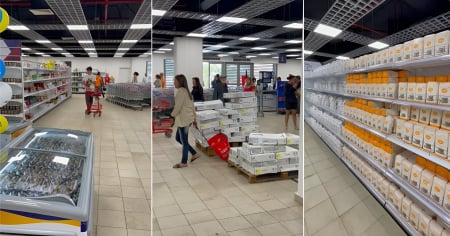Yamilet Álvarez Tejo, head of the Commercial Department at Tiendas Caribe, expressed regret in statements to the Round Table this Wednesday about the mockery that has arisen regarding the change in candies given to customers at the store on 3rd and 70 in Havana.
The management not only defended that change method as the only viable alternative due to the lack of coins in dollars, but also clarified that there are other products available near the cash registers for those who do not want candy as change.
When mentioning one of the "concerns" they encountered since the establishment's opening, Álvarez Trejo deemed the issue of change to be "problematic," and for this reason, he urged to preferably use electronic payment channels.
"Mockery and ridicule have been quite prevalent [...] but there are not just candies, there are other products available there, at the cash registers, to offer the customer as compensation for their change," he pointed out.
"When paying in cash, when change needs to be given in cents, the availability of small change is often lacking, and this is a drawback," he insisted.
Randy Alonso did not hesitate to state that "in other partially dollarized economies, it also happens," although he did not provide examples.
Announce the opening of dollar stores nationwide: More sweets on the way
The Cuban government announced the expansion of dollar stores throughout the national territory, as part of the process of partial dollarization of the economy.
Ernesto Martínez, the first vice president of Corporación CIMEX S.A., stated that this is a gradual effort to increase the presence of this type of business, especially in small markets that are easy to supply.
"The incorporation of the stores has been carried out with the consensus of CIMEX and Tiendas Caribe, based on the principle of opening the new supermarket in smaller markets that are easy to supply. This is especially true for those linked to the real estate sector and others associated with projects that will be signed and will facilitate both wholesale and retail sales across the country, but gradually," he explained.
The announcement comes in the midst of a complex economic context, characterized by the partial dollarization of the Cuban economy.
The regime has assured that accounts in Freely Convertible Currency (MLC) will remain in the banks on the island, while defending the presence of the dollar in the economy.
Critics of the process that includes stores operating in a foreign currency have pointed out that this measure exacerbates inequalities, as a large part of the Cuban population does not have access to this currency and continues to receive their salary in national currency.
The Supermercado de 3ra y 70, inaugurated this month and located in Miramar, Havana, was presented in the official media as a space that is "accessible" "for the general population," despite the fact that the high prices in dollars make it unattainable for a large portion of Cubans.
Frequently Asked Questions about Dollarization and Change in Candies in Cuba
Why does the supermarket at 3rd and 70 give change in candy?
The supermarket at 3rd and 70 in Havana gives change in candies due to the lack of fractional currency in dollars. The management of the establishment has defended this practice as the only viable alternative in light of the shortage of low-denomination coins. Additionally, they offer other products near the cash registers to offset the change in cash.
How does partial dollarization affect the Cuban economy?
Partial dollarization in Cuba exacerbates economic inequalities, as a significant portion of the population lacks access to the dollar and continues to receive their salary in national currency. This measure, although aimed at attracting foreign currency, has been criticized for widening the gap between Cubans who can shop in exclusive stores and those who cannot.
What implications does the practice of giving change in candies have for Cubans in exile?
For Cubans in exile, getting change in candy is seen as an insult and a lack of respect for the effort they put into sending remittances. This practice symbolizes the government's disdain for the real needs of the population and has caused discomfort among those who support their families from abroad.
What is the goal of the expansion of dollar stores in Cuba?
The Cuban government seeks to expand dollar stores as part of an effort to increase the capture of foreign currency and "control" the flow of foreign money. However, this measure has been criticized for perpetuating an unequal economic model by restricting access to these businesses to those who possess foreign currency.
Filed under:
